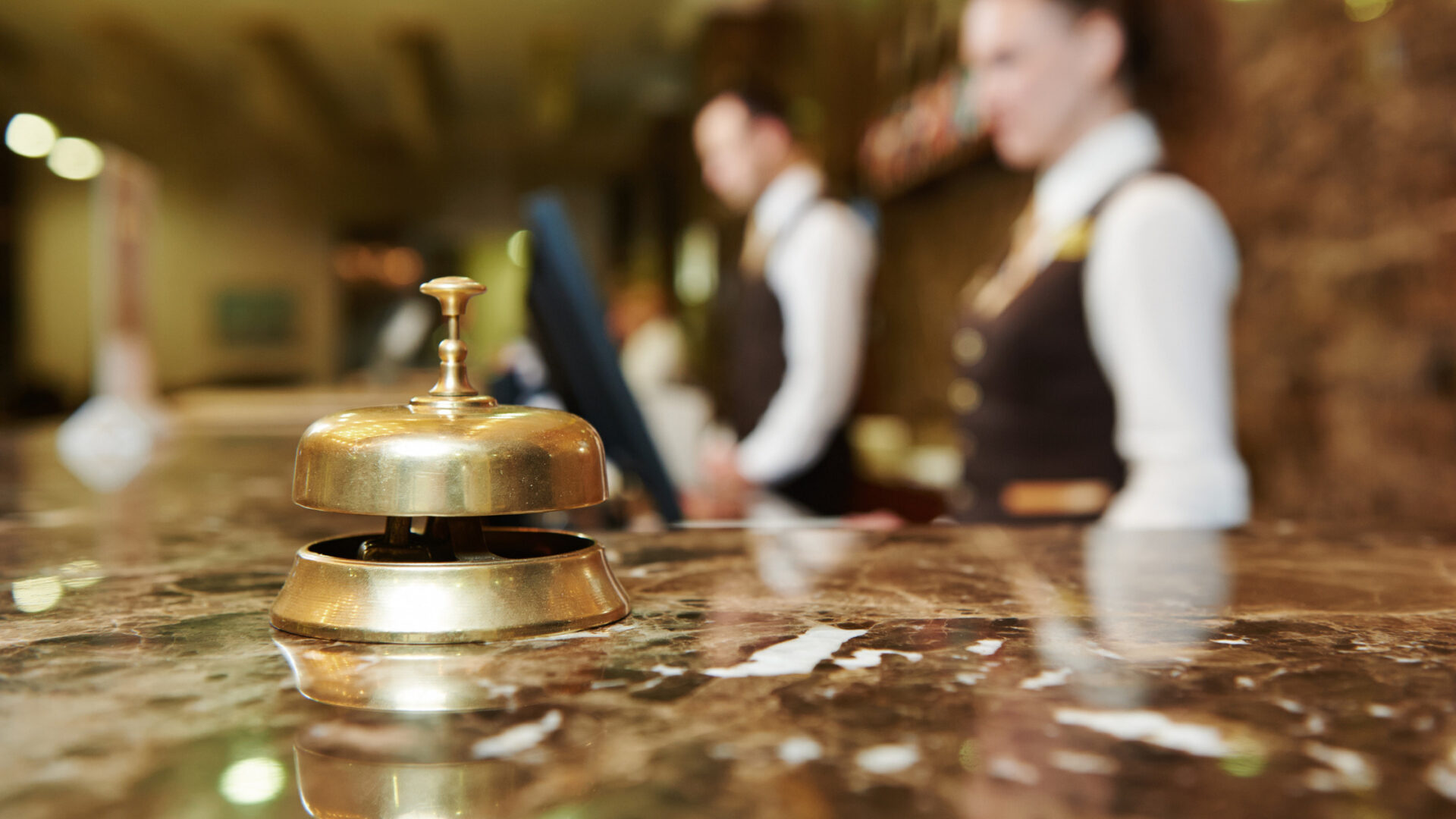From strategy, to software, to start-up costs: everything a new hotel owner needs to know
In this guide, we deep dive into how to start a hotel business with step-by-step instructions and actionable tips. Whether you’re new to the hotel game or looking to grow your existing premises – here’s how to run a successful hotel.
In a world where renting out a property is easier than ever – all it takes is an internet connection and a host profile on Airbnb – arguably, anyone can become a hotelier. But as anyone who’s done it will tell you, owning a hotel business goes far beyond giving people a place to sleep. The most successful hotel businesses take that practical need and turn into an unforgettable experience for their guests. It doesn’t matter whether you’re starting a five-star hotel, a family-friendly resort or budget motel – how you make your guests feel will determine your hotel’s reputation. And with online reviews the lifeblood of the hospitality industry, it’s critical that every guest leaves satisfied.
That’s why we created this guide – to help you dive deep into the crucial elements of starting – and growing – a successful hotel business.
Guide Contents:
- Your introduction to the hotel industry
- What type of person can run a hotel?
- Find your place in the market
- Choosing your hotel identity
- Pull it all together: creating a hotel business plan
- Crunch the numbers: the cost of getting started
- Spread the word: develop a marketing plan
- The A-team: hiring and training staff
- Smooth operation: implementing systems
- Support for setting up your hotel with Preno
When the first-ever hotel opened in 1768, everything was managed on paper – a huge ledger with guest details painstaking recorded. Computers and spreadsheets made things easier, and more recently, hotel management software streamlined everything from start to finish.
ENJOYING WHAT YOU’RE READING? JOIN OUR NEWSLETTER EMAIL LIST
Join our newsletter list & receive helpful hotelier tips & tricks, industry trends & more!
Even so, it takes an entrepreneurial mindset and a passion for the business to tap into what is now one of the largest industries in the world. Your drive to serve and delight your guests while managing multiple tasks with grace and dignity will determine the culture and success of your team.
For your hotel to thrive, you must be willing to step up, work hard and understand that customer experience is everything.
Find your place in the market
First, you need to thoroughly understand what it means to own a hotel. Soak up the latest news, thought leadership and best practices from local and international experts – Preno, for example, sends fortnightly industry news. While researching hotels in your area, you might find there’s no demand for your initial idea or that a slight tweak to your plans could prove more profitable.
A strong market analysis will help you decide whether you build or buy, or if adding efficiencies like new technology could streamline operations and improve your bottom line.
Choose your hotel identity
Your style of hotel will inform several business decisions. It isn’t easy to transition from one type to another, so choose carefully based on your market research.
- Boutique. Often smaller, with unique characteristics, e.g. historic building
- Family-friendly. Larger rooms, extra beds, entertainment facilities and attractions close by, caters to the entire household
- Budget. Lower rates, scaled-back amenities to pass savings on to the customer
- Luxury. High price tag, top-notch service, access to four or five-star amenities, e.g. spa, concierge, room service
Pull it all together: creating a hotel business plan

A business plan is critical to laying out the foundations of launching, promoting and operating your business. To secure investment, it’ll be a requirement.
Here’s a summary of what your business plan should include. You’ll find more detail on some of these aspects further in the guide.
- Executive summary. Give a high-level overview of your hotel business plan – short and concise. Include your mission statement and your objectives.
- Brand positioning. Dive deep into the story of your brand – who you are, your unique selling points and your target audience.
- Market/industry analysis. Demonstrate that you understand the market you’ll be operating in – both from a local standpoint, and a broader look at the industry. This will show investors your potential for growth based on local travel patterns and industry trends.
- Competitor analysis. Highlight your understanding of your competitors, and how your hotel fills a gap in the market. A SWOT (strengths, weaknesses, opportunities, threats) analysis is a good way to do this.
- Customer segmentation. Break down your target market: demographics, location, socioeconomics and behaviours. This is also known as crafting a guest persona. It’s important to understand your primary target market intimately, so you can cater for an experience that meets their needs and expectations.
- Strategic plan. Cover marketing, distribution and revenue management in this section. This is where you’ll convince investors that you have a sound plan to connect with customers, manage your inventory and maximise your revenue.
- Operations plan. Create a detailed plan that covers staff, operating processes, suppliers and inventory management – everything involved in operating your hotel business.
- Financial plan. Start talking money. Start-up costs followed by ongoing expenses (payroll, purchases, rent and utilities), forecasts and profit potential.
- Management team. Introduce the people who will be running your business, their backgrounds and their capabilities.
- Important milestones. Include a timeline of relevant milestones (build, opening, profitability). This gives you progress markers to aim for and will increase your likelihood of success.
- Appendix. Add additional information or supporting documentation to the appendix. Your business plan should focus on important strategic highlights – everything else you can add at the end.
Crunch the numbers: the costs of getting started

There are several variables that will determine the cost of opening a hotel:
- Location. Tourist hotspots and inner-city hotels will be more expensive than somewhere more regional or rural.
- Quality. Starting a five-star resort will be a lot more expensive than a budget motel.
- Size. Number of rooms and hotel facilities (restaurant, meeting room, spa, gym).
While it’s challenging to pinpoint the cost of setting up a hotel business, there are five areas you’ll need to include in your start-up budget:
- Land. Any real estate fees associated with purchasing land or securing a lease for your hotel site.
- Building and construction. Whether you’re starting from scratch, renovating an existing property or buying into a franchise, this will take up the largest portion of your start-up budget. Hotel owners typically need a lot of capital to get started, but you could secure a construction loan to fund this part of the project. Either way, your building costs will vary depending on your footprint, quality of materials and current building condition.
- Soft costs. Non-construction-related expenses like insurance, architects, consents, permits and taxes, designers and lawyers.
- Furniture, fixtures and equipment. These are the costs associated with furnishing your hotel – anything that’s moveable, i.e. beds, electronic equipment, tables, chairs and desks.
- Working capital. For hiring staff, paying salaries and any expenses incurred before you open your doors and the cash starts coming in.
Now that you’ve got some numbers down on paper, it’s time to figure out whether your hotel venture is feasible. The numbers will tell you if your capital costs are worth the risk. Estimate key revenue and expenses like room pricing, vacancy rates and revenue per room. Don’t forget ongoing operating expenses like maintenance, wages, advertising, stock (service products and equipment) and utilities.
Run through a handful of scenarios in your forecasting to see how key decisions or events will impact the potential profitability of your business. You can find out more about calculating hotel metrics and conducting a hotel market analysis in this guide:
< How to calculate ADR and other hotel metrics>
Spread the word: developing a marketing plan

You’ve secured financing, the build or renovations are well underway – now you need to share your hotel with the world. Your hotel marketing plan is an important part of your overall business strategy. This is how you’ll communicate with your target audience – using your market research to guide you.
There are lots of ways to market your hotel – be creative and brainstorm ways to make your business stand out. There’s traditional marketing like TV, print and radio, or partnering with a PR agency or travel agent.
In addition to setting up a well-optimised website and booking engine, here are some digital marketing ideas you’ll want to explore:
- Online travel agents (OTAs)– Think Booking.com, Expedia, TripAdvisor, and others. Most accommodation providers manage this through a channel manager like Preno.
- Social media marketing – Facebook, Instagram and LinkedIn are the big three. Even if you don’t use all platforms straight away, you’ll want to secure as many handles as you can. Here’s a simple guide to creating a social media strategy that works.
- Paid versus organic advertising – Google Ads, boosted Facebook posts and sponsored Instagram posts are all examples of paid marketing. Sharing content like blogs or videos on YouTube through your social media platforms is designed to drive customers organically to your website.
Want more ideas on how to promote your hotel business online? Read this guide:
<The ins and outs of hotel online marketing>
The A-team: hiring and training hotel staff

Hiring the right team members can make or break your plan to grow a successful hotel business. Most skills and knowledge can be taught but finding people with the right innate characteristics is critical.
Attracting a stellar team
Before you place any job ads, get clear about the type of people you want to hire – what values, insights and skills will they bring to the team? Clarity here will ensure you attract like-minded people who share your vision. Your employees reflect your brand, so they need to exemplify the character traits you feel are most important to your hotel.
You’ll then need to figure out a plan: role, requirements, hiring timeline and training. Depending on whether you buy or build, and the size of your hotel business, there will be key team members you’ll need to hire first. These are usually sales and marketing, finance, project management and facilities.
Onboarding – get to know the team
Once you’ve got the team, the work doesn’t stop. Proper onboarding and training are chances to show people the ropes and give your team time to gel before the big opening day. Extra training for particular roles may be needed.
Smooth operation: implementing systems

Before you open your doors, you’ll need to set up hotel systems and software to streamline and automate operations, so you can run your business leaner and more efficiently. Your requirements for user-friendliness and functionality alongside your budget will come into play when choosing the best hotel management system for your property.
Here are some options you’ll want to consider:
- Hotel management system. This will likely be at the top of your list. Without a system to manage your bookings, you’ll be in the red before you’ve even started. A good system will facilitate management and administrative tasks including front-desk operations, rate and occupancy management and payment processing. It also connects to all the other important tools your hotel uses – like Xero or Lightspeed.
- Channel manager. Channel managers allow you to automate changing your rates and managing your availability across all your channels – so you don’t have to spend all day doing it.
- Booking Engine. These help you avoid the 15% fees charged by OTAs like Booking.com and Airbnb by collecting bookings directly via your website. Be sure to pick a booking engine like Preno that is optimised for mobile, and tailored to create easy conversions.
- Accounting software. Preno’s world-class integration with Xero ensures the two applications work seamlessly together to automate invoicing, bookkeeping and payment processing – making it easy for hoteliers to manage their bookings and accounting in one place. Well-connected systems will give you clearer insights into how your business is performing.
- Restaurant management software. If your hotel offers food and beverages in a restaurant or similar, you’ll want a Point of Sale (POS) system that connects your restaurant to your hotel management system. This will allow guests to charge back to their room. Preno and Lightspeed enable this type of customer experience.
Time to open the doors: launching your hotel business

This is when things can get a little scary – but also exciting! You’ve put in the hard work, you’re ready to open the doors – and invite your first guests in.
Opening events are often well-received and they’re a great chance to connect with your local community and key stakeholders. Put your best foot forward by planning an event that reflects your purpose and values and focus on building relationships.
Go forth and conquer – you’re ready
The hotel industry is a hyper-competitive environment, and the disruption of Covid-19 in the last year has triggered a fundamental shift in the way accommodation facilities operate. Despite all the change, customer experience is one of the most important elements in determining the success of a new or existing hotel business. If you know what your target hotel guests need, and you can deliver on this, plus more (i.e exceeding customer expectations), your hotel’s reputation – and success – will be off to the best start. It’s a big bet and the risk is high, but careful planning, strategy and empowering your operation with the right technology will set you on course to starting a successful hotel business.
Transform Your Guest Experience With Preno
With Preno, seamless management is just a click away. Embrace the future of hospitality with our free trial, no strings attached.
Need help setting up your hotel?
Try Preno, we offer a fully integrated, cloud-based property management system that simplifies your hotel processes.
Talk to the Preno team about getting set up.





